
Caleb Schepart
Dr. Kenneth B. Clark Academy
Dobbs Ferry, New York
The Dr. Kenneth B. Clark Academy (KCA) in Dobbs Ferry, New York is part of the Greenburgh-Northcastle School District, a special act district that teaches students with significant learning and developmental diagnoses that require specially designed instructional approaches to support their individualized education program (IEP) objectives.
Caleb Schepart, the music teacher at the KCA, is familiar with special act schools. As a child, his parents both worked at a school similar to KCA, which was designed to meet the unique learning needs of the residential students living on campus in the care of a residential agency. Schepart joined the school’s staff in 2004, helped develop its burgeoning music program and worked there for 10 years while completing his education to become a certified music educator. “After teaching for several other school districts, I was delighted to return to my roots at another special act school,” he says.
Because his students at KCA are typically “nontraditional learners who have not found success in their home school districts, I developed a nontraditional music program to better meet their unique learning needs,” Schepart explains. “I want my students to be intrinsically motivated to participate, ask questions, sing, play and otherwise learn about music.”
KCA doesn’t have a formally defined band, but rather it supports a variety of small groups that form and regroup depending on the songs, projects and performance opportunities that the students are interested in. “I manage and oversee these groups, placing as much responsibility as possible with the students. There are different kinds of performance and recording opportunities throughout the year,” Schepart says.
To facilitate his nontraditional program, Schepart created a nontraditional learning environment by transforming his class so that it has the look and feel of a café/coffee house. “I wanted to create a ‘real-world’ music space that had to function as a classroom. The café/coffee house vibe feels like a place where people can relax and also get things done. There is a performance/stage area, chessboard café tables that also function as desks and a PA system,” he says.
The nontraditional classroom décor is an important part of creating a low-pressure music-oriented environment where “students who otherwise showed little willingness to play or sing started singing unconsciously and without fanfare, or made requests to play a karaoke track for them, or showed me what they knew how to play on the piano but had kept to themselves for the past three years,” he says.
KCA’s administration have supported Schepart’s vision, including the flexibility to create courses for unique groups of students. “I am able to offer empowering learning experiences through a skillful blend of technical instruction and inquiry-based learning,” he explains.
For example, Schepart developed an instrument-making course and a course on music in video games, film and TV. “These courses supported brain-based learning and offered opportunities for students to leverage their multiple intelligences,” he says. “Part of my research for the creation of these courses involved interviewing and surveying prospective students, so I was able to plan the courses with student interests in mind.”
During the instrument-making course, students constructed kalimbas (thumb pianos). “We listened to music and talked while our hands were busy with the often repetitive tasks of cutting, smoothing, bending, drilling, wire wrapping and assembling,” Schepart says. “A conversation about the ethics and legality of harvesting and using hard woods led to discussions on economics, climate change, physics, poaching and rights for indigenous people.”








